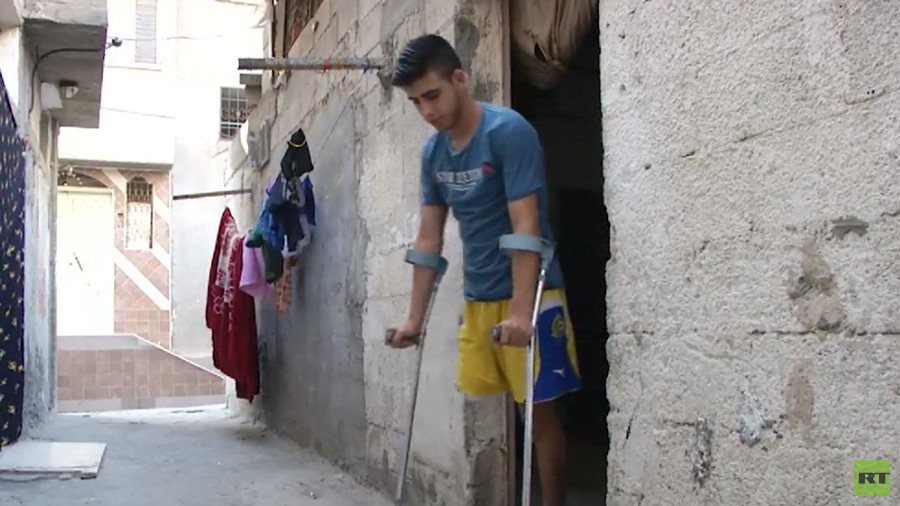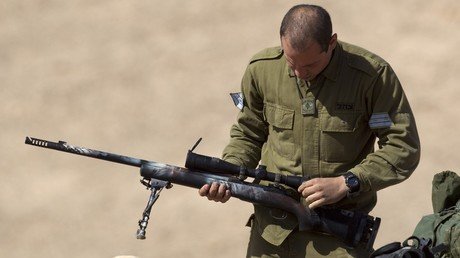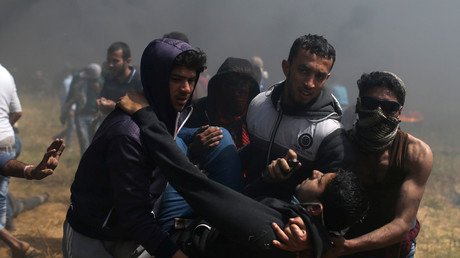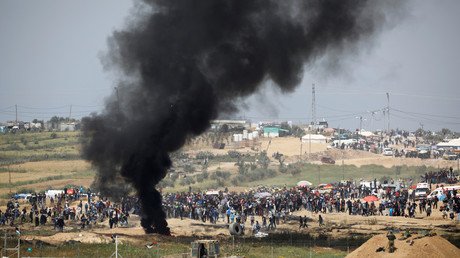‘I didn’t think my leg would be like this’: Gazan who lost limb in IDF sniper fire talks to RT

Two young Palestinian athletes had their dreams shattered after being shot during the recent Gaza protests. They told RT Arabic how the encounter with Israeli soldiers saw their sports careers vanish.
The youths relayed their story as the massive Great Return March entered its fifth week. Both athletes were present at the rallies to mark the mass exodus of Palestinians from their land in 1947 ahead of the establishment of the State of Israel.
As the stand-off turned violent, a bullet fired by a suspected Israeli soldier tore into the right leg of Mohammed al-Ajoury, a 17-year-old Gazan. He was treated for the gunshot wound but, when his condition became life-threatening, the leg had to be amputated. Israel has repeatedly threatened Palestinians with the use of live ammunition during the protests, citing “security reasons.”
Al-Ajoury, who spent six hours in surgery and then one week in intensive care unit, told RT: “I didn’t think my leg would be like this. I wasn’t aware that it would be amputated. It seems that my relatives told the doctors not to tell me that.”
“I was an athlete, I used to play multiple sports and I used to play for the Palestinian Union,” he said with a bitter smile. The 17 year old recalled that the Israeli soldiers “were brutally shooting people,” saying that an old man was hit by an explosive bullet in front of him. “He was protesting peacefully and was not throwing any stones,” al-Ajouri said.
Life has also become miserable for Mohammed Abed, a promising Palestinian football player, who was also shot in the leg by the Israelis. “During my football career, I hoped to be one of the best players in Gaza,” Abed told RT. “After this injury, my football career is over.”
The former athlete was filming himself during the protests in order to post the footage to social media. “While I was filming, a sniper shot me in the knee and it was dislocated,” he explained, lying on a bed.
“I was targeted without warning, I wasn’t a threat to the soldiers at all,” Abed reiterated. “If God helps me, I will be able to have surgery and hold the Palestinian flag high in the European countries,” he said, adding, “my dream was to participate in the European leagues.”
Hospitals in the Gaza Strip are often unable to treat traumatic injuries, international aid groups warn, because medical facilities are often overwhelmed and understaffed. Marie-Elisabeth Ingres, who heads Doctors Without Borders’ (MSF) Palestine mission, told RT that the group had treated 147 gunshot victims in the last week, despite medical supplies and surgeons being in short supply.
Ingres said that many of the injured will need weeks or even months to recover. For Palestinians who have been shot, medical treatment “is not only a question of one day,” she said. “It will last several months for some of them … they will need several surgeries. So it’s not only a question of one day. It will last [a long time].”
RT has reached out to the IDF to confirm whether the snipers had orders to target limbs of violent protesters as part of the military’s rules of engagement. Yet, the IDF has merely responded by claiming it has been warning Gazans “for weeks” not to approach the security fence, saying the troops were contending “with shootings against them, rock throwing, hurling of firebombs and spreading masking smoke.”
The Israeli military insisted that it used “live fire in a precise and measured manner” only "as a last resort.”
Human Rights groups have recently denounced the IDF’s tactics, pointing out that the use of live ammunition to any part of human’s body has the potential to kill. “The deployment of snipers, and the careful planning and significant number of injuries to the lower limbs does reflect an apparent policy to target [those] limbs,” Omar Shakir, Israeli-Palestinian director at Human Rights Watch, told Washington Post.
Think your friends would be interested? Share this story!
















